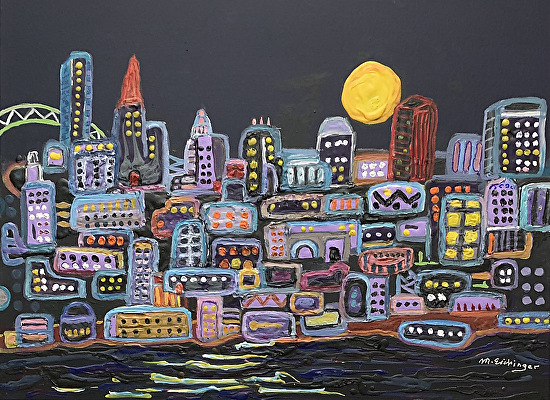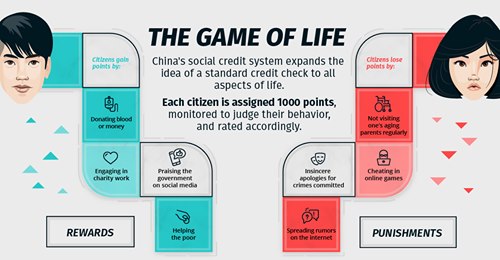
Faced with burgeoning populations that are difficult to control, businesses and governments are testing ways to influence social behavior. Face recognition programs, computer data banks, and point systems based on good behavior are worming their way into the economy.
Keeping Score: The Social Economy
Though the United States never had a caste system as in India, we’ve always had a social ranking system. In our country we score based on status, origin, resources, skin color, family ties, education, and reputation. The civil rights demonstrations that occur periodically are loud shout-outs to this issue. They are a way of fighting against an inequitable ranking system.
Contemporary ranking systems have added another way to pigeonhole people by scoring their behavior. They use sophisticated computer technology to socially rate people for corporate or political purposes. The goal is to influence the way providers and customers interact through social engineering. It is causing participation in Social Credit Clubs to expand worldwide.
Governments and corporations are engineering ways to use social pressure to change the way people act, succeed at work, and contribute to society. Some are voluntary schemes to get lower insurance fees, while others being developed in authoritarian countries are not up to the individual to join. China is taking the concept to its extreme by monitoring behavior with the Game of Life. The game is made up of three interconnected parts: a master database, a blacklisting system, and a punishment and rewards mechanism. It is transparent social governance, meaning that all data is shown with no privacy at all.
Each citizen is assigned 1000 points to monitor and judge behavior. People are rewarded for things like donating blood, engaging in charity work, taking one’s parents to the doctor, and helping the poor. They are punished for spreading rumors on the internet, cheating on online games, jaywalking, playing loud music, and not visiting one’s aging parents regularly. Reward points earn work promotions, tax breaks, easier access to bank loans, and priority for children’s school admissions. Punishments may keep a person from booking flights or train tickets, make them ineligible for certain jobs, restrict access to public services, and cause public shaming on social media and TV platforms. It is a Big Brother approach to a cooperative society. Pilot projects have taken place since 2014 with plans to implement the Game of Life nationally sometime this year.

If you think this Orwellian nightmare can’t happen in the U.S. guess again, it already is. The New York State Department of Financial Services gave insurance companies permission to base premiums on social media posts. An example given is of an Instagram picture of a man teasing a grizzly bear at Yellowstone with a martini in one hand, a bucket of cheese fries in the other, and a cigarette in the person’s mouth causing his insurance premium to increase. Another picture on a Facebook post shows that a person doing yoga can save money. Insurance companies see ratings as an extension of the lifestyle questions asked when applying for life insurance. If you say no to rock climbing and then post pictures of yourself on social media soloing, it could count as a yes. According to Forbes, it is possible in the future that posting while driving, boasting about an unregistered pet, or leaving on geotagging while on vacation and thus signaling to thieves that your house is vacant could influence your premium.
PatronScan is a company that manages customers for bar and restaurant owners. It helps spot fake IDs and scans a list of troublemakers who, on previous occasions, committed objectionable activities – fighting, sexual assault, drugs, theft, or other bad behavior. The list is shared among all PatronScan customers in the U.S., the U.K., and Canada. Judgment about what kind of behavior qualifies for inclusion on a list is up to the bar owners and managers.
Airbnb bans customers for life for any conduct they consider objectionable. With more than 6 million listings in its system, being banned can limit travel options. It is easy to get blacklisted on Uber as well. Though there is a system that lets passengers, rate drivers, they also installed one that allows drivers to rate disruptive passengers. Amazon and eBay have been using rating systems for years, tracking honesty in product presentation and timeliness of deliveries. A reciprocation scoring system promotes mutually acceptable behavior.
WhatsApp will ban you from using their service if too many users block you for sending spam, threatening messages, or trying to hack into their app. Though the service isn’t very significant in the United States, it is a great punishment in some countries. Of course, we’ve all saw what happened to Donald Trump when we told too many lies on Twitter and Facebook. He’s banned for life and struggling how to develop a social media presence that rivals them.
Social ranking systems categorize people on identity, popularity, power, and resource allocation. Their prescribed norms, values, and behaviors are governed by algorithms. How they work and who is rewarded is unknown to the public. Those who have more than 20,000 visitors to their media sites are considered influencers and as such, are given special treatment. Businesses also study social media sites to determine who to approach when looking for customers. Real estate agents have become especially adept at weeding people out when deciding who to rent to. They look for people with a big online following to boost awareness of their rentals, search for wealthy individuals, and though it is illegal, eliminate minority populations they deem to be undesirable.
Social credit systems work outside the legal system. There is no jury, judge, legal representation, and often there is no appeal. It is a system where the accused have few rights. It is enforced by private companies, not the government, and operates without public input. In the future, it may be that law enforcement, rather than being determined by the Constitution or the legal system, will be determined by licensing agreements made with Corporations.
Social systems may help our countrymen and women become better-mannered and more considerate drivers. They may act as a reminder to treat others as they would like to be treated, to not spread falsehoods, to not litter, and to care for those in need. But, as systems are established it is important to consider who sets the standards for behavior. What cultural norms and values do most Americans find important? It would be easy to exacerbate caste-like social divisions if systems are not equally applied to all. And, if social credit systems continue to expand, we must make sure they are monitored fairly. There is much to consider.
Resources:
Elgan. M. (2019)Uh-oh: Silicon Valley is building a Chinese-style social credit system. Fast Company. retrieved from https://www.fastcompany.com/90394048/uh-oh-silicon-valley-is-building-a-chinese-style-social-credit-
Jones, K. (2019) The game of Life: Visualizing China’s Social Credit System. Visual Capitalist. Visual Capitalist. retrieved from https://www.visualcapitalist.com/the-game-of-life-visualizing-chinas-social-credit-system/
Hockett, R. (2019) When is ‘Social Credit’ Orwellian? Forbes. retrieved from https://www.thebalance.com/best-peer-to-peer-lending-companies-4580285
Baron, J. (2019) Life Insurers Can Use Social Media Posts To Determine Premiums As Long as they Don’t Discriminate. Forbes. retrieved from https://www.forbes.com/sites/jessicabaron/2019/02/04/life-insurers-can-use-social-media-posts-to-determine-premiums/?sh=ecc8b3923ce1
Boyle, M. reviewer (2021)What is Time Banking? Investopedia. retrieved from https://www.investopedia.com/terms/t/time-banking.asp#:~:text=Time%20banking%20is%20a%20bartering,to%20supplement%20government%20social%20services.
(2018) Social Credit: China’s Digital Dystopia in the Making. Youtube. PBS.
Hiyser, K. (2019) Report: America Has a Social Credit System Much Like China’s. Futurism. retrieved from https://futurism.com/america-social-credit-system-china
Fenwick, A. (2019) How’s your social credit score? Hult International Business school. retrieved from https://www.hult.edu/blog/your-social-credit-score/
I look forward to hearing from you. Please respond below.
Art is always for sale. For information about City Connections contact me at marilynne@eichiingerfineart.com.
